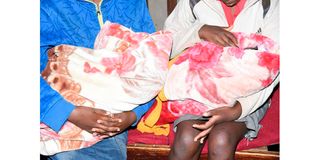Official blames poor parenting for rampant child abuse

Fourteen-year-old twins from Uasin Gishu County with their babies aged two days and six days respectively, at their home in Ng’enyilel, Turbo, on September 01, 2021. In Tharaka Nithi County, an official has blamed parental neglect for the rising cases of teenage pregnancies, among other vices.
What you need to know:
- Tharaka Nithi County Coordinator of Children's Services Wachira Kiragu, has told journalists that children neglected by their parents are the main victims of defilement, teenage pregnancies, female genital mutilation and early marriages.
- He said many parents do not care about the whereabouts of their children, especially during holidays and weekends when they are out of school.
The increased cases of child abuse in Tharaka Nithi County is as a result of poor parenting, an official in the county has said.
County Coordinator of Children's Services Wachira Kiragu, yesterday told journalists in Chuka town that children who have been neglected by their parents are the main victims of defilement, teenage pregnancies, female genital mutilation and early marriages.
He said a total of 1,800 cases of child neglect were reported in the county during the government year that ended in June.
“Children who have been neglected by their parents are the main victims of child abuse,” said Mr Kiragu.
He said many parents do not care about the whereabouts of their children, especially during holidays and weekends when they are out of school.
He observed that society has also departed from the traditional communal role of taking care of the children. That it has remained ignorant of children’s sexual consent age, resulting in rampant cases of defilement.
The official said his office in collaboration with other players in the region will work on strategies including running civic education on the importance of protecting children, to curb the vices.
Abuse cases
He said the directorate has also come up with a child protection management information system, a system where everyone has access to all information on children.
“We want to do away with the ignorance on the rights of children by availing the information to members of the public,” he said.
Since poverty is a major contributor to abuse cases, Mr Kiragu said 168 orphans received a maximum of Sh30,000 in form of bursary last year, while 3,700 vulnerable households were beneficiaries of a Sh94 million cash transfer stipend.
The official said more vulnerable households were being enrolled into the cash transfer program, including the ones that were erroneously dropped from the system in 2018.
@alexnjeru5





